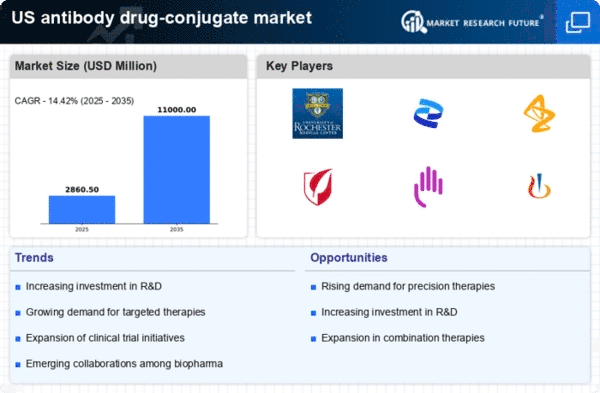Rising Cancer Incidence
The increasing incidence of cancer in the US is a primary driver for the antibody drug-conjugate market. According to the American Cancer Society, approximately 1.9 million new cancer cases are expected to be diagnosed in 2025. This alarming trend necessitates innovative treatment options, with antibody drug-conjugates emerging as a promising solution. These therapies combine the targeting capabilities of antibodies with the cytotoxic effects of drugs, potentially improving patient outcomes. As healthcare providers seek effective treatments, the demand for antibody drug-conjugates is likely to rise, thereby propelling market growth. The focus on personalized medicine further emphasizes the need for targeted therapies, which antibody drug-conjugates can provide. Consequently, the increasing cancer burden is expected to significantly influence the trajectory of the antibody drug-conjugate market in the coming years.
Advancements in Drug Development
Recent advancements in drug development technologies are significantly impacting the antibody drug-conjugate market. Innovations in conjugation chemistry and linker technologies have enhanced the efficacy and safety profiles of these therapies. For instance, the development of more stable linkers has improved the therapeutic index of antibody drug-conjugates, allowing for higher doses with reduced side effects. Furthermore, the integration of artificial intelligence and machine learning in drug discovery processes is streamlining the identification of suitable targets and optimizing clinical trial designs. As a result, the time and cost associated with bringing new antibody drug-conjugates to market are decreasing. This trend is likely to attract more investment and research into the field, fostering a competitive landscape that could lead to the introduction of novel therapies. Thus, advancements in drug development are poised to play a crucial role in shaping the future of the antibody drug-conjugate market.
Regulatory Incentives for Innovation
Regulatory incentives aimed at fostering innovation in the pharmaceutical industry are positively influencing the antibody drug-conjugate market. The US Food and Drug Administration (FDA) has implemented various programs, such as the Breakthrough Therapy Designation and Fast Track designation, to expedite the development and approval of promising therapies. These initiatives are particularly relevant for antibody drug-conjugates, which often address critical unmet medical needs in oncology. By providing a streamlined regulatory pathway, the FDA encourages companies to invest in the research and development of these innovative therapies. As a result, the antibody drug-conjugate market is likely to see an increase in the number of approved products, enhancing treatment options for patients. The supportive regulatory environment is expected to continue driving growth in the market, as companies seek to capitalize on these incentives.
Growing Awareness of Targeted Therapies
The rising awareness of targeted therapies among healthcare professionals and patients is driving the antibody drug-conjugate market. As more information becomes available regarding the benefits of personalized medicine, there is a growing demand for treatments that specifically target cancer cells while sparing healthy tissue. This shift in treatment paradigms is encouraging oncologists to consider antibody drug-conjugates as viable options for their patients. Educational initiatives and conferences are further promoting the understanding of these therapies, leading to increased adoption in clinical practice. Moreover, patient advocacy groups are playing a crucial role in raising awareness about the availability and effectiveness of antibody drug-conjugates. As awareness continues to grow, it is anticipated that the antibody drug-conjugate market will experience a corresponding increase in demand, ultimately benefiting patient outcomes.
Increased Investment in Biopharmaceuticals
The growing investment in biopharmaceuticals is a significant driver for the antibody drug-conjugate market. In recent years, venture capital funding for biotech companies has surged, with investments reaching over $20 billion in 2025 alone. This influx of capital is facilitating research and development efforts focused on antibody drug-conjugates, which are seen as a vital component of the future of cancer therapy. Pharmaceutical companies are increasingly allocating resources to develop these targeted therapies, recognizing their potential to address unmet medical needs. Additionally, partnerships between biotech firms and larger pharmaceutical companies are becoming more common, further accelerating the development of innovative antibody drug-conjugates. As the biopharmaceutical landscape continues to evolve, the antibody drug-conjugate market is likely to benefit from increased funding and collaborative efforts aimed at bringing new therapies to patients.
















